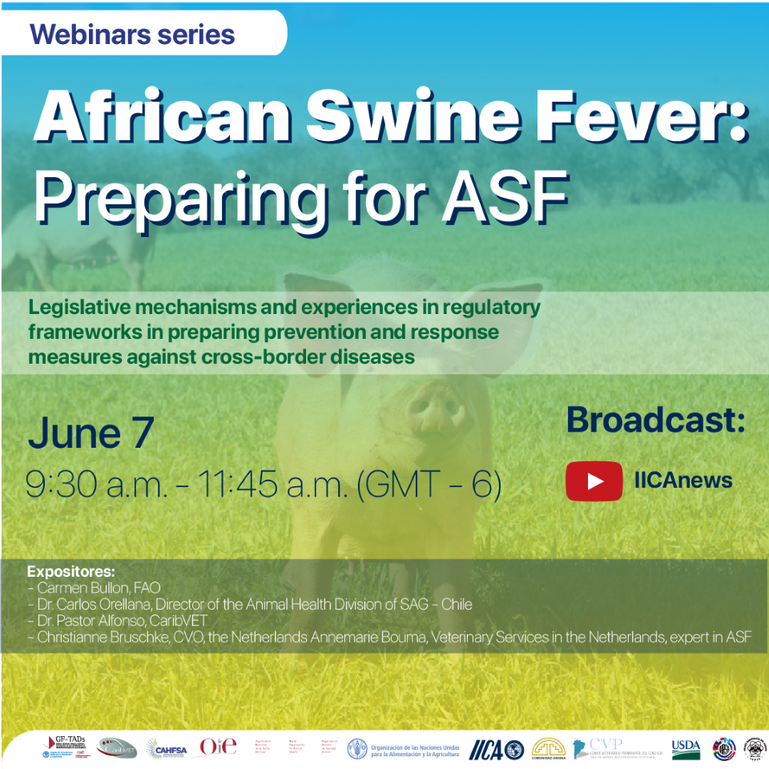
Information provided to Latin American and Caribbean countries on the legislation methods to prevent and respond to transboundary diseases through the experiences of other countries. Includes the participation of five very prestigious speakers with subjects such as: “Elements for legislation in animal health,” “Experience in Chile in its legislation for transboundary diseases,” “Experience of Cuba in its ASF legislation” and “Experience of the Netherlands in its ASF legislation.”
Carmen Bullon: Law graduate with a Master’s in European Union International Law and a Master’s in International Trade. Before entering the FAO she worked in the Department of International Relations and Community Law of the Public Administration of the Autonomous Community of Galicia. For the last sixteen years she has worked as legal officer in the law service for the development of the FAO, where she deals with issues of animal and plant health, food safety and agricultural production and the One Health approach. She has worked in over fifty countries and different regional organizations, supporting the development of legislation and the strengthening of legal issues in agriculture and food.
Dr. Hugo Araya: Veterinarian from the Universidad de Concepción, Chile, with a diploma in emerging and re-emerging diseases from the Universidad de Chile. He began his professional career in the Undersecretariat of Public Health of Chile as office manager in the commune of Los Vilos. He then joined the Agriculture and Livestock Service as veterinarian and official inspector in abattoirs in the Valparaíso region. In 2013 he became regional supervisor of livestock imports and exports and in 2017 became regional livestock manager in the same region, where he was tasked with facing two health emergencies, due to the outbreak of low pathogenic avian influenza, and was appointed campaign chief to control and eradicate avian influenza H7N3 in 2019. He currently works as manager in the Regional Animal Health Service in the livestock protection division.
Dr. MV Pastor Alfonso: Tenured Investigator of the National Center for Agricultural Health (CENSA) with a doctorate in Veterinary Sciences (2003). He has thirty years’ experience in the design and implementation of applied research to contribute to the advance of animal health surveillance and control programs and participation in various scientific-technical services for the verification of suspicious exotic diseases in animals. He is an expert at the World Organisation for Animal Health (OIE) and manager of its Center for Collaborative Research on Disasters Risk Reduction, part of CENSA. Member of the Caribbean Animal Health Network (CaribVET) and head of its epidemiology task force. He works as a lecturer and is a member of the Academic Commission of the National Doctorate Program in Animal Health and the Master’s Degree Program in Veterinary Microbiology and Preventative Veterinary Medicine.
Dr. Christianne Bruschke: Graduated as a veterinarian in 1991 and started working in a private mixed practice in the north of the Netherlands. In 1993 she joined the department of Virology of the Central Veterinarian Institute of Lelystad, where she did her doctorate in pestivirology and headed the laboratory for bovine virology from 1994. After the classical swine fever outbreak in the Netherlands she was seconded for a year to the Inspection Service for Livestock and Meat to support the updating of the Dutch contingency plans. A year later she returned to Lelystad as head of the Mandatory Declaration Diseases Unit and two years later she became director of the Division of Infectious Diseases. In 2005 she joined the Ministry of Agriculture and was seconded to the OIE where she led the global Avian Influenza Program. In 2008 she returned to The Hague as Deputy Chief Veterinary Officer and since 2010 she is the Chief Veterinary Officer of The Netherlands. She is the primary adviser to the Minister of Agriculture on all veterinary and veterinary public health issues.
Dr. Annemarie Bouma: Obtained a Master’s in Biology from the School of Biology in Leiden in 1985. In 1992 she graduated as a doctor in veterinary medicine (DVM) from the School of Veterinary Medicine in Utrecht. In 1996 she obtained her doctorate in the experimental transmission of pseudorabies virus (quantification of the spread of the virus in groups of pigs, using stochastic models), completing her doctoral thesis in 1997. She participated as a scientist in the Central Veterinary Institute (also known as ID-DLO, ID-Lelystad, Animal Science Group, all various names for the famous Lelystad institute), working on avian viruses, classical swine fever, foot and mouth, and the epidemiology of mandatory declaration diseases, between 1996 and 2002. She was associate professor of the School of Veterinary Medicine, Department of Epidemiology, working in infectious diseases in poultry and pigs, bacterial, viral and microparasite infections. She was co-promoter of various doctorate students in the years 2002-2015. Since 2011 she is Senior Policy Officer in the Ministry of Agriculture, Nature and Food Quality, involved in infectious diseases (e.g. HPAI, African Swine Fever, SARS-CoV-2 in mink), outbreak control and contingency plans, animal health regulations, OIE matters.



